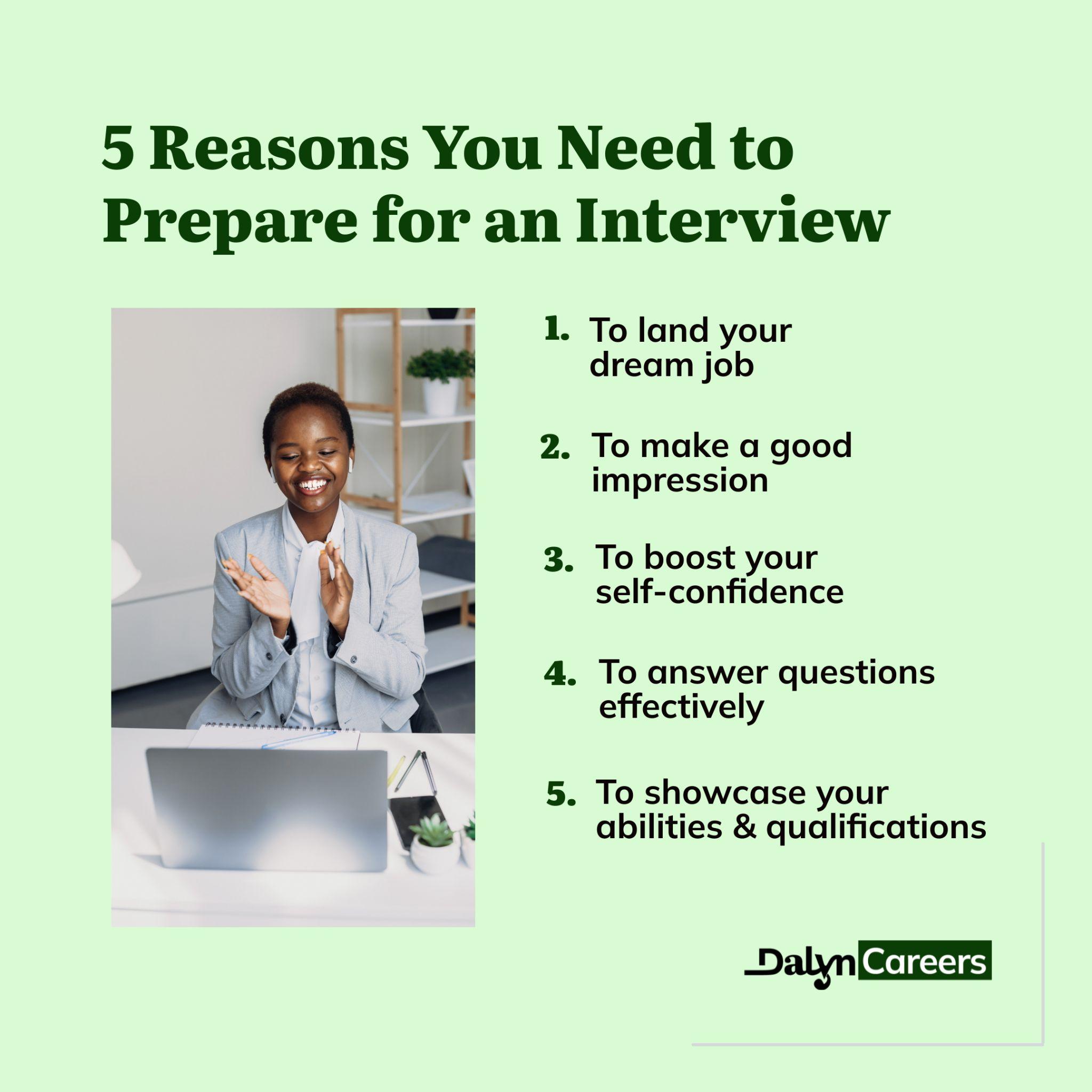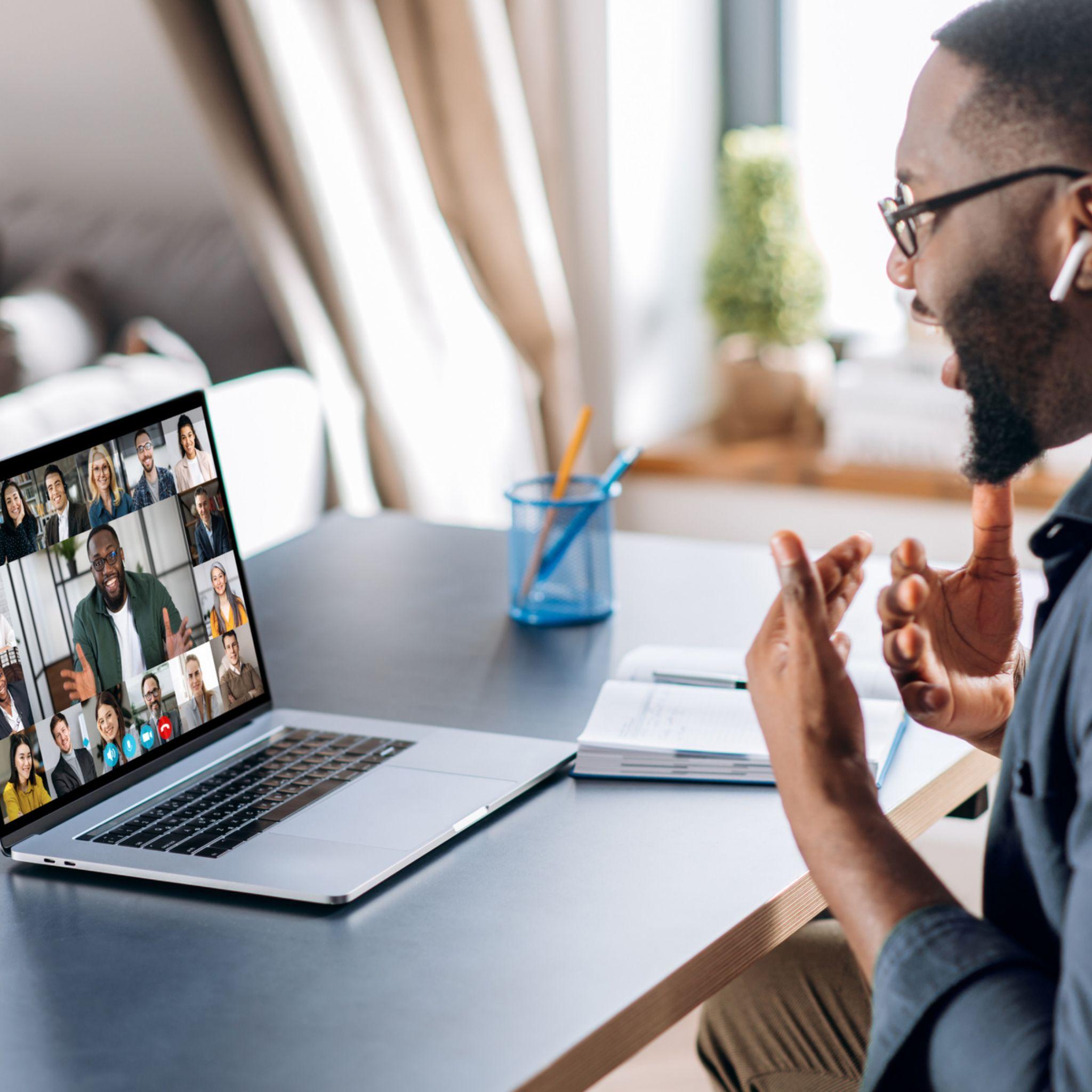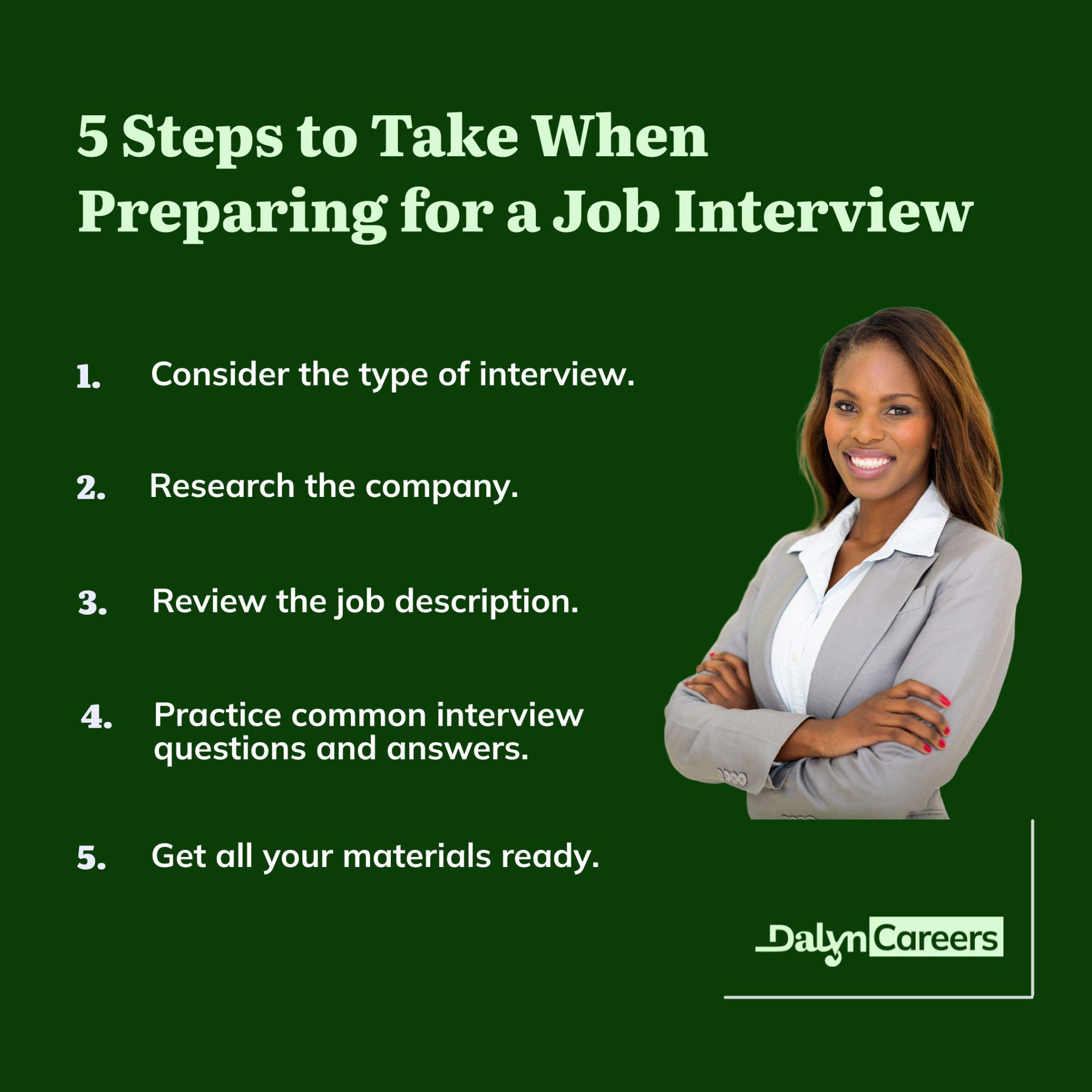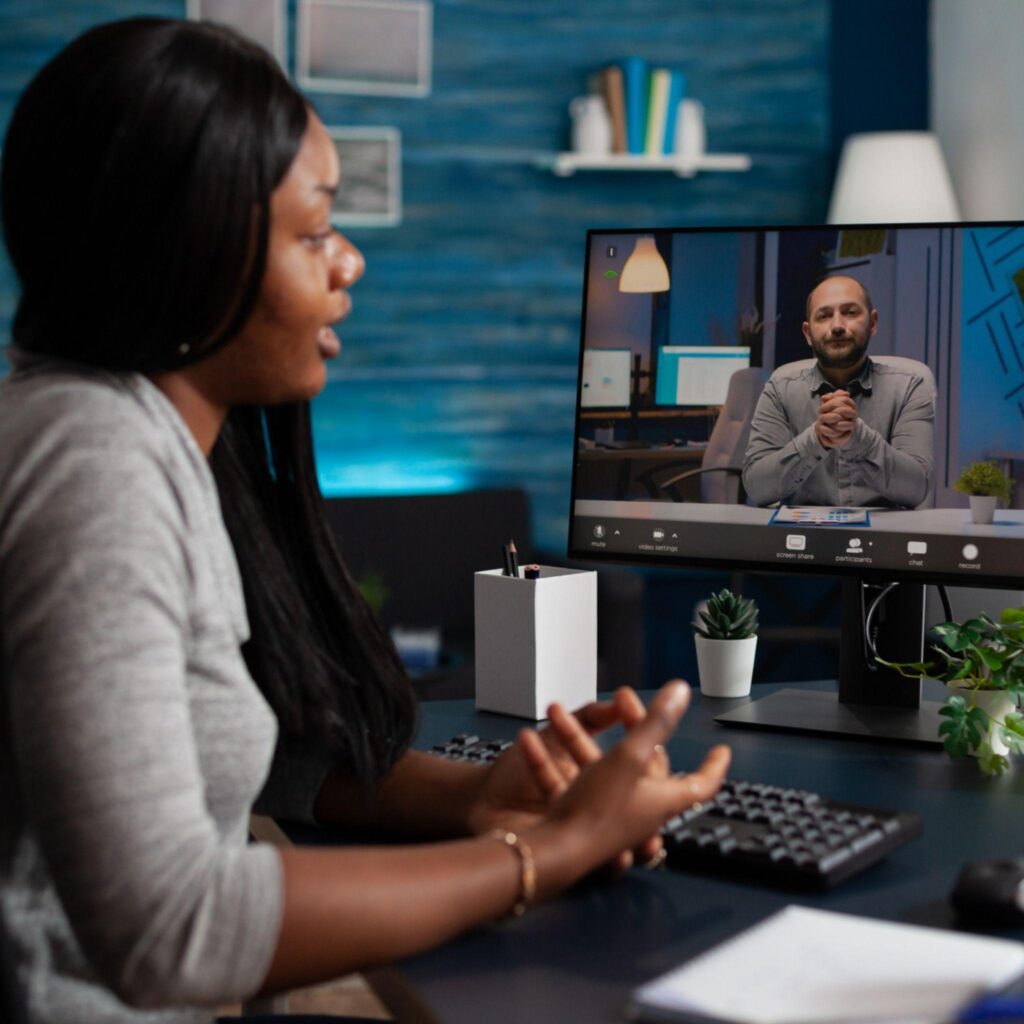Are you worried and uncertain about your upcoming interview? Do you feel like you’re not preparing enough? You want to make a lasting impression and get selected as the right candidate. Feeling unsure about an interview can make you lose confidence in your abilities. This feeling can even get worse as the date of the interview approaches.
However, you don’t have to feel anxious about this. With the right preparation, you can make the interview an opportunity to shine and showcase your abilities.
In this article, you’ll learn how to prepare for interview to land your dream job. The steps include:
- Considering the type of Interview
- Conducting research about the company
- Reviewing the job description
- Practising some common interview questions and answers
- Getting all your materials ready.
What is a job interview?
A job interview is an official meeting between a job seeker and a representative from a company. An interview is an opportunity for you to know about the company and for the company to know you. The interviewer asks you questions such as your skills, experience and interests. By answering the questions correctly and adequately, you’ll showcase your unique abilities and how you’re a great fit for the job.
A job interview is an avenue for you to learn more about the company and the position you’re being interviewed for. Between the interview questions or towards the end of the interview, you can ask questions about the specific roles and responsibilities at the job and the work ethic of the company. This gives you the chance to consider their prospective offer of a job and presents you as a strong candidate.

Why you need to prepare for an interview
Preparing for an interview is important for achieving your career goals. It helps you to showcase your abilities, qualifications and what makes you the right candidate for the job you desire. Here are some other reasons you need to prepare for an interview:
- To boost your self-confidence
- To answer questions effectively
- To make a good impression
- To land your dream job.
How to prepare for a job interview: 5 steps to take
1. Consider the type of interview
The first thing to consider when preparing for an interview is the type of interview. Find out the type of interview you will have. Is it a physical or virtual interview?
Physical interview
A physical interview is a face-to-face meeting between the recruiter and the employment candidate. This type of interview usually happens in an office setting. In a physical interview, you get to meet the interviewers in person and have a direct conversation with them.
Physical interviews can also be one-on-one or panel interviews. In a one-on-one interview, you only have a conversation with one interviewer. In a panel interview, a group of interviewers will take turns to ask you questions. In a group interview, you’ll be interviewed alongside other applicants.
In a physical interview, you may need to find the location in advance. Finding the interview location in advance helps you plan your route and arrive on time. It also reduces stress by familiarizing yourself with the surroundings.

Virtual interview
Virtual interviews are conducted using software applications like Zoom, Google Meet, and Skype. Instead of meeting in person, this type of interview allows you to communicate with your interviewer through a computer or a mobile device.
The virtual interview is increasingly popular because it makes it easy for people from different locations to connect. Virtual interviews include phone interviews, live video interviews, and pre-recorded interviews.
To ensure a successful virtual interview, it’s essential to focus on some key aspects.
First, dress appropriately and professionally. This will help create a good impression of you. In addition to your appearance, be mindful of your environment. You may need to stay in a quiet well-lit place. A comfortable environment will help the interviewer to focus on you without distractions. Also, make sure you have a strong internet connection to avoid any sudden disconnections during the interview.
HR manager, Victoria Okwueh, at Beacon Gates Limited, shared a story of candidates that made a bad impression as a result of poor virtual interview preparation. A candidate turned off her camera during a virtual interview. When she was asked to turn her camera on, it was discovered that she was tying a wrapper and wearing a hairnet. Another candidate turned on his camera but was seen wearing a singlet. When asked about the outfit, he responded that there was no power supply and everywhere was hot.
It is important to note that a virtual interview is just as important as a physical interview. Hence, thorough preparation and professional conduct are crucial to making a good impression on the interviewer.
2. Research the company
When you know the type of interview you’ll be attending, the next step is to research the company. You can do this by gathering relevant information about the company.
According to career expert Amaka Ntuabunauzor, just as you appreciate hearing positive things about yourself, “companies love to hear all the amazing facts about themselves repeated to them.” Therefore, when asked about a company, it is essential to provide a more comprehensive response instead of a one-line response. By stating specific and impressive aspects of the company, you can make a good impression and show your interest in their accomplishments and values.
To do this, simply visit the company’s website and social media pages to learn more about its mission, values, and products or services. If they don’t have an online presence, check out the email or location address and phone number on the job advertisement and contact them for more information about the company. Another way to gather information about the company is to reach out to former or current employees of the company.

Understanding the company’s background will help you align your responses to the company’s needs during the interview. It’s also important to look at the company’s work culture and work environment to see if they align with your personal values.
By researching the company, you’ll get to note down thoughtful questions you’d ask the hiring managers during the interview. This will show that you did your homework. You can also make a good impression and stand out as a well-prepared and motivated person.
Imagine going to an interview and not getting the name of the company you applied for right. This can be the consequence of not doing your research.
3. Review the job description again
Granted, you already reviewed the job description before your application and sent in a strong resume. That’s why you’ve been invited to the interview. Before the interview, you need to carefully review the job description again. This means reading and understanding the requirements and responsibilities of the position you’re applying for and considering any questions the interviewers may ask.
Make sure you clearly understand the duties and responsibilities of the positions you’re applying for and you can also align your skills and experience to the job requirements during the interview.
4. Practise common interview questions and answers
During an interview, you’ll be asked various questions to test your skills, experience, and qualifications. It is important to practise common interview questions and answers ahead to put yourself in the right frame of mind.
Practising common interview questions makes you think about your experiences and skills. You can invite a family member or friend to act as a hiring manager and ask you these questions while you attempt them. By attempting these questions and sometimes failing, you’ll see the areas to improve. This helps you respond confidently to the exact or similar questions during the interview.

5. Get all your materials ready
This means gathering everything you will need for the interview. Put together your important documents, such as hard copies of your CV, cover letter, and educational and training certificates. Put them in a good folder, so you can easily access them when they’re requested.
Remember to take any document mentioned specifically in the interview invitation. For example, you might be asked to come with two copies of your CV, academic credentials (such as your BSC or HND degree), O-level, and First School Leaving certificates (both original and photocopies).
Also, consider keeping your documents safe in cloud storage in case (I.) the hiring managers request email copies during the interview, (II.) you lose or accidentally damage the hardcopies on your way to the interview venue due to rainfall or something out of the blue.
So, you can always make more copies at cybercafes around the interview venue. Preparing your materials in advance will keep you organised and ready for a successful interview.
9 Common interview questions and answers
The following are common interview questions that hiring managers ask job seekers. Your responses to these questions will help them learn more about you and your qualifications.
These likely questions and answers give you an idea of what to expect in your interview.
1. What value can you offer?
Here, the recruiter wants to know what skills and qualities you have that can help the company.
How to approach/answer it
- Mention your skills that match the specific needs of the company. If you applied to be a graphic designer, for instance, and you have great driving skills, it would be unwise to highlight your driving skills. Instead, emphasise graphic design skills such as image editing, colour theory and file formatting skills. You need to consider the specific requirements mentioned in the job description.
- Back up your response with concrete examples or achievements you have made. It could be true stories of your exceptional achievements from where you previously worked. For instance, if you are a digital marketer, you could respond this way:
I have analytical skills. I can examine market trends and reach the target market. I can also create compelling content across various social media platforms for the target market. In my previous workplace at Oriflame Cosmetics in Enugu, my team and I strategized and built a solid online presence that increased our sales.
2. What is your understanding of teamwork?
The interviewer wants to know how you view working with your colleagues or team members. They will want to know if you understand the importance of teamwork and how it helps in the work environment.
How to approach/answer it
- Explain how you see teamwork and the benefits of teamwork. Point out that teamwork helps to achieve complex goals and increases productivity.
- Give an instance from your own experience where you worked with others to achieve a successful outcome.
Example
I enjoy working with others, and I like to have a team to plan with and get different ideas from. During my time at Oriflame company in Enugu, I worked as a digital marketer with a team to promote Oriflame cosmetics products. It was a nice experience. During the promotion, we had challenges. We would put in a lot of energy and time, but in the end, make a little sale. My team and I were able to come up with different helpful ideas that helped us double our sales.
3. Where did you work previously and why did you leave?
This question is for the employer to know about your previous employment, your experience, and why you left. Your interviewer simply wants to know about your career history and progress.
How to approach/answer it
- Mention where you worked previously and your role. Highlight the things you learnt during your time at your previous place. Explain how the company and the role shaped your professional growth and prepared you for future opportunities.
- Explain why you left. Remember to focus on the factors that reflect positively on you. It could be a desire to grow or seek new opportunities.
- Also, avoid speaking negatively about your previous work or workplace. Speaking negatively of your previous employer or colleagues won’t give a good impression of you. Employers look for trustworthy people who can keep important information private and handle conflicts respectfully.
Example
I worked as a customer service representative at GLO Telecommunications company for 2 years. During my time with the company, I learnt how to provide excellent customer service, handle customer inquiries, and resolve issues. After working with the company for two years, I’m ready to take on a new challenge and grow. I’m also happy to learn something new. I know this role will allow me to gain new knowledge while adding value to the company.
4. How did you contribute to your former workplace?
The recruiter wants to know how you helped the company or the team you worked with in your previous workplace.
How to approach/answer it
- Mention the things you did that were helpful in your previous work. It could be completing tasks on time or suggesting new ideas to improve your team’s work process.
- It’s important, to be honest, and make your response concise.
Example
While working with Glo Telecommunications, I contributed to improving customer satisfaction through prompt and accurate responses to inquiries and resolving issues efficiently. I also participated in team meetings and shared insights with my colleagues and supervisors on how to improve our work process.
5. How do you manage time?
This question is for the recruiter to know how efficiently and effectively you maximize your time and complete your tasks.
How to approach/answer it
- Explain the importance of time management. Point out how effective time management helps you meet deadlines and accomplish your goals.
- Explain your strategy for managing your time. Explain that you:
- Create a to-do list to plan out your day
- Prioritise your tasks based on their importance
- Avoid distractions and focus on the task at hand.
- Break down big tasks into smaller manageable parts.
Example
Time management helps me to meet deadlines and accomplish my tasks faster. In my previous work as a teacher at a secondary school in Lagos, I would create a daily lesson plan for the topics to be covered and other activities. I also prioritize the most important subjects or lessons. I prepare ahead of time to ensure I cover the topics. To avoid distractions, I implemented classroom rules and routines that encouraged students to remain focused during lessons.
6. How do you manage stress?
The interviewer wants to know how you hold up during stressful times. Do you melt down under pressure? By sharing your stress management techniques, you can show how you positively manage stress.
How to approach/answer it
- To answer the question, you can talk about the different ways you cope with stress. You can mention things you do to stay calm and handle difficult times. It could be talking to a friend or engaging in activities outside your job that you enjoy like your hobbies.
- You can also mention that you prioritise tasks, break them into smaller parts, and work on them one at a time.
Example
I’ve realized that stressful times will always come up, and to manage stress, I have a few methods that work for me. With every new experience, I think I get better at handling stressful situations. While working as a receptionist at LogartsHill Hotel in Anambra, I encountered stress and pressure during one Christmas period. My first step was to take a moment out of work to come back with a clear head. I spoke to my younger sister as a way to unload my thoughts, and I also hung out with one of my friends. This really worked well for me because I came back to work with a lighter head and felt less overwhelmed.
7. How do you approach or solve problems?
The interviewer wants to know how you deal with problems. They want to know if you can think critically and come up with quick and useful solutions to problems. By explaining techniques, and how you solve problems, you’ll show that you’re a great fit for the job.
How to approach/answer it
- Start by explaining how you try to understand the problem. It could be asking questions or conducting research yourself.
- Next, mention your ability to generate different solutions or ideas.
Example
I always focus on the solutions instead of the problem. First, I try to understand the problem clearly before seeking solutions. I ask questions to understand the various areas of the problem. Once I understand the problem well, I split it into manageable parts to make it easy to solve. Then I‘ll look for solutions. After that, I evaluate the solutions to choose the best one. The next step is to solve the problem with the solution. If one solution fails to work, I move to the next. I also put on a positive attitude and focus during this process.
8. Why do you think this job is for you?
Your employer wants to know what makes you stand out as the right person for the job.
How to approach/answer it
- Highlight how your interests and passions align with the job.
- Connect your past experiences. Mention your former job and how it’s similar to the current role you’re interviewing for. Explain how that experience has shaped and prepared you for this current opportunity.
Example
I think this work is for me because I have the skills and qualities to meet the requirements of the role. Working as a receptionist for over 2 years, I have gained valuable insights into customer satisfaction. Now, I’m ready to take on new opportunities.
9. How fast can you adapt to a new place?
The interviewer wants to know how quickly you can adjust and feel comfortable in the new environment.
How to approach/answer it
- Explain how you see new things and places as an opportunity to learn and grow.
- Highlight your flexibility and ability to adjust to new routines, rules, and expectations.
- Talk about your ability to quickly familiarise yourself with a new environment and adapt fast.
- Give an example from your past experiences where you successfully adapted quickly to new places. It could be at your previous workplace.
Example
I’m passionate about growth, and growth comes with new things, environments, experiences, and challenges. My method is to keep an open mind and learn as fast as possible. During my role as a customer representative in GLO Telecommunications, I adapted quickly to the environment with an open mind and eagerness to learn. I reached out to some of my colleagues for guidance and used some of their ideas in my work. I was able to blend in with the team fast.
Note: It is important to ensure that the examples and experiences you share during your interview align with the information included in your CV, particularly in the work experience section. Avoid the mistake of sharing an experience that is not in your CV, as the recruiter might doubt your honesty. Hence, always remember to update your CV regularly to keep it accurate.
How to answer interview questions confidently
1. Speak in a clear and composed manner
To answer interview questions confidently, you need to express your thoughts clearly. This means speaking in a composed manner and ensuring that your ideas and thoughts are easy to understand. You can achieve this by organising your thoughts and using simple grammar. If you can speak this way, you’ll communicate clearly and sound confident.
Speaking clearly gives a good impression of you and increases your chances of securing the job.
The following are tips for speaking in a clear and composed manner:
- Speak at a good pace. Don’t speak too fast or too slowly. Give yourself time to think about what you want to say.
- Take deep breaths before you speak. This will help you stay relaxed and calm. It also prevents you from becoming too nervous.
- Avoid complicated words that might confuse your interviewer. Making a good impression doesn’t lie in using complex words. Instead, use simple words that are easy to understand.
- Pay close attention to your interviewer’s questions. Before you respond to any question, understand what the question is all about. It’s only when you understand a question that you can answer correctly.
- Speak up when responding to any question. Pronounce your words well and avoid mumbling. If you’re not sure about a word, take a moment to think.
- Maintain eye contact with your interviewer while speaking. It shows that you’re confident.
2. Focus on your strengths
Another way to answer interview questions confidently is to focus on your strengths. This means highlighting the positive qualities that make you the right candidate for the role. Instead of discussing the areas you need to improve, focus on what you can do best.
When you focus on your strengths, you portray yourself in a positive light. It’s also a way to reassure yourself.
To focus on your strengths in an interview, you can follow these steps.
- Identify your strengths. Take time to think about your skills, experiences, and personal qualities that make you suitable for the job. For instance, when discussing the strengths of a receptionist in an interview, strong communication skills, organizational skills, good customer service skills, interpersonal skills and technical proficiency can be your skills.
- Go through the requirements in the job description. Compare your strengths with the skills and qualities mentioned in the job description. Then identify which of your strengths match the job role. For example, the job description for the role of a receptionist might be the following, good verbal and written communication skills, strong technical know-how, interpersonal skills and the ability to multitask, prioritise, and manage time effectively. With the example above the skills that match the descriptions include organizational skills, good customer service skills, strong communication, interpersonal skills, and technical proficiency.
- Find specific examples where you have shown those strengths. It can be examples from your previous work or academic projects.
- Frame your answers with the experiences where you have shown those skills. Then try to respond to the interview questions with those experiences. Explain how you excelled in that particular task and how you can bring this to this new work.
3. Do not be afraid to ask for clarification
Another way to answer interview questions confidently is to ask for clarification when you don’t understand a question. It’s okay to ask for further explanation when you encounter an unclear question. Understanding a question helps you to answer clearly and confidently.
Tips for asking for clarification
- Be polite when asking for clarification. Use expressions like “Excuse me” or “May I ask a question?” Then ask the interviewer to repeat the question. You might say, “Could you please repeat the question? I want to make sure I heard right.”
- If there are certain aspects of the question you didn’t understand, point out those parts. For example, you could say, “I didn’t clearly understand the part you said… Could you please explain it again?”
- If the information is still unclear, politely ask the interviewer to give you an example of what they mean. You could say, “Could you please give me an example to help me understand the question better?”
- While the interviewer speaks, make sure to listen carefully.
- Remember to thank them after the clarification. You might say, “Thank you for the explanation. I understand it better now.”
4. Be mindful of your body language
To answer interview questions confidently, you need to be mindful of your body language. Your body language is how you use your body to show or express your feelings. To put up the right body language, be conscious of your facial expression, how you sit or stand, how you use your hands, and how you make eye contact.
Your body language sends a message even without saying a word. For example, sitting up straight and making eye contact can show that you’re confident and interested in the subject. By being mindful of your body language, you present yourself in a good light. However, slouching or fidgeting might give the impression that you’re not confident.
The following are tips that can help you to be mindful of your body language:
- Maintain a good sitting or standing posture: Sit up straight with your shoulders back. Also, avoid crossing your arms as it can make you appear defensive.
- Make eye contact: Look at the interviewer as they speak or when you’re responding to their questions.
- Throughout the interview, remember to smile when it is appropriate.
- Avoid moving around or playing with your fingers or objects.
Tips for preparing for a job interview
1. Do your research
The importance of doing your research before going to an interview cannot be overemphasised. When you do your research, you’ll be prepared and answer interview questions accurately. You will also be able to make a positive impression.
2. Dress properly
It’s important to dress properly when going for an interview. Dressing properly shows professionalism. It also helps you feel confident.
3. Be punctual
Being punctual to an interview allows you to relax and stay calm ahead of the interview. On the other hand, a late rush can make you nervous. Additionally, being punctual showcases your organisational skills and reliability. You should be at the venue 15 to 20 minutes before the scheduled interview time.
4. Stay optimistic
Maintaining a positive mindset when preparing for an interview is important because it boosts your confidence. It also helps to improve your performance during the interview.
5. Be honest and authentic
Remember, you don’t have to pretend or lie to land a job. Be honest and real. Don’t act or speak in a way that is not you. Answer questions truthfully and present yourself genuinely.
What is the purpose of a job interview?
The main purpose of an interview is for you and the company to know more about each other.
In an interview, the recruiter wants to know who you are as a person and a candidate beyond your application and curriculum vitae (CV). An interview allows them to meet you in person and know how well you fit the position. By responding to their questions, they’ll assess your knowledge, skills, experience, and other essential qualities required for the job.
You also get the chance to know the company and the job beyond what they have in their job description and advertisement. Through your conversations with the interviewer, you can learn more about the company’s culture, values, and future plans. This allows you to assess if their values and plans align with your own goals and values.
Conclusion
Preparing for a job interview effectively is crucial for landing your dream job. By following the practical steps in this guide, you can approach your interview with excitement and confidence and succeed.



